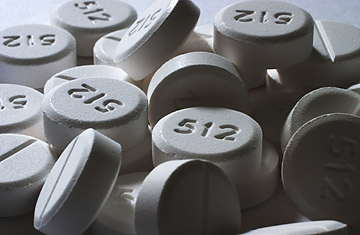
(3 of 3)
The American Geriatrics Society says it took these considerations into account before writing its new guidelines. "There have been older studies that suggested that opioids may be associated with an increased risk for falls, and that's obviously a risk that physicians and patients should know about," says Ferrell.
Potential to Treat Psychological Pain
One of the most intriguing new findings regarding opioid use came out of a study including 696 Navy and Marine troops who were injured in combat in Iraq between 2004 and 2006. Published in the New England Journal of Medicine in January, the study found that soldiers who were given morphine during resuscitation and treatment for physical trauma were half as likely to develop posttraumatic stress disorder (PTSD) as those who did not get the drug.
Since the most severely injured troops were the most likely to receive morphine — and since this same group would be at a higher risk for developing PTSD — the finding is particularly striking. "It's incredibly exciting," says Dr. Glenn Saxe, associate professor of psychiatry at Harvard Medical School, who has conducted similar research in pediatric burn victims. "You could potentially be able to [reduce] the likelihood of getting a bad disorder like PTSD."
Saxe's research suggests a mechanism by which opioids may affect PTSD risk. Trauma researchers have long known that social support is critical for recovery from PTSD, and that the brain's natural opioids are involved in feelings of nurture and bonding. Saxe found that the pediatric patients in the hospital who had the most anxiety about being away from their families were also the most likely to develop PTSD, but in those treated with opioids for pain, the risk was reduced. "The pathway was opioid dose reducing separation anxiety, and reduced separation anxiety reducing PTSD," says Saxe.
Paradoxically, the findings suggest that the use of opioids could even help prevent addiction by reducing the risk of a psychological condition that is known to lead to substance misuse. "PTSD is so devastating, and it increases the likelihood of addiction," says Volkow. "I think it's definitely worth investigating."
Better Treatment Regimens Needed
Over the past few decades, researchers have made strides in understanding the treatment of certain kinds of pain. Relieving acute pain from trauma or surgery, for instance, reduces immediate suffering, but also speeds healing and reduces complications; the short-term use of opioids in the hospital is known to be safe and effective.
But because the how-tos in the treatment of chronic pain are much murkier, research suggests that still only a fraction of such patients receive the medication they need. While in some cases, doctors are using these powerful drugs too often, in others, concerns about misuse may have caused pain patients to suffer unnecessarily. "There is both overprescribing and underprescribing," says Volkow, who notes that, for instance, many dentists give opioids like Percoset too freely to teenagers after surgical procedures; in contrast, "you have individuals with very severe pain who are not given opioids or who are given doses that are [too low to treat the pain], and that in and of itself can put them at risk."
Doctors are often afraid to dispense high doses, sometimes at the expense of patients' daily functioning. "Those are the kinds of doses that get doctors arrested," says Siobhan Reynolds, founder of patient-advocacy group the Pain Relief Network. But as researchers figure out the best way to use their most powerful pain relievers, patients are beginning to benefit, Reynolds says. "More people are getting a very little bit of opioids, and that's good," she says. "But those who need high doses are still being put through hell. These drugs are a miracle for the right people: they're not good or bad; they're just what is."
